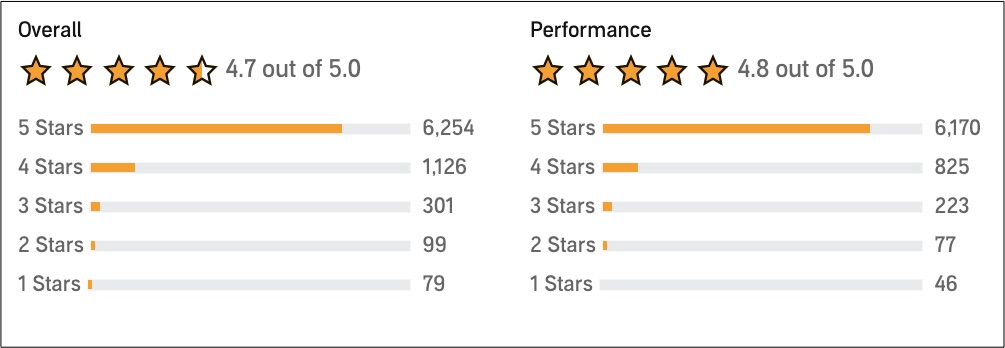Like me, perhaps you look for 5-star ratings. Much less, and I search for another brand or book:

Together though, we are creating “reputation inflation”…and that is a problem.
5-Star Ratings
According to Pew Research, close to 82 percent of us sometimes check online reviews. How often and how much we trust them depend on how frequently we shop online and our age. As you might expect, the habitual online shoppers who are younger are more likely to use and believe online reviews:

Firms, however, don’t want just any review. In a recent podcast from The Journal, we are told how sellers respond to Amazon search results. Because they need more clicks and sales for a top position, good reviews matter. As a result, we could receive a gift with a purchase and a review request. One olive oil sprayer seller offered to pay a buyer if she removed a 1-star review. Others try to use Facebook groups to accumulate 5-star reviews.
At the same time, through its ranking and Hall of Fame, Amazon has its own reviewer incentives. Do look at the whopping numbers:

Ironically though, when 5-star reviews accumulate, they become less meaningful.
Our Bottom Line: Diminishing Marginal Utility
At this point, we can compare five stars to a McRib.
An economist would say that McRib eaters are experiencing diminishing marginal utility because each new serving gives them less extra pleasure. Recognizing how unlimited availability could bring marginal utility down to zero and even into negative territory, McDonald’s soon removes the McRib from the menu.
Similarly, according to “Reputation Inflation,” the more we see above average ratings, the less useful they become. Called reputation systems, Uber and Lyft scores mostly dwell in that 5 star region. They let drivers know that less is “bad.” Encouraged by the sellers and perhaps good will, over time our scores rise.
Like the McRib, diminishing marginal utility sets in. For one seller, that fifth star, though crucial, has little meaning. And then, when the majority of products have five stars, we attach less significance to the highest rating.
My sources and more: Recently, because of this podcast on Amazon reviews, one of my morning walks was quite pleasant. Looking for more, I wound up at Pew Research and the NY Times. Then for the academic perspective, this NBER paper came in handy. But if you read just one article, I recommend Wired for how Amazon creates the ratings. (Please note that most of my McRib paragraph was in a previous econlife post.)







The same is true or worse for hospital reviews